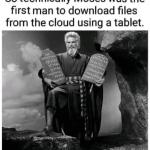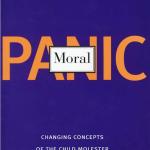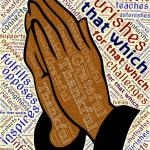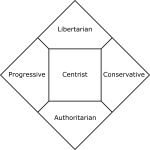David George Moore conducted the following interview. Dave blogs at www.twocities.org.
Dru Johnson is an assistant professor of biblical studies at The Kings College in New York City. The following interview revolves around his book, Biblical Knowing: a Scriptural Epistemology of Error.
Moore: I know that Biblical Knowing is a rework of your doctoral work. Would you tell us a bit how you got interested in this study?
Johnson: Originally, I was going to do doctoral work in social psychology. I enjoyed research design, statistical analysis, and the way scientific constructs attempt to capture human behavior. In a sudden turn of events, I ended up going to seminary instead and read Michael Polanyi’s Personal Knowledge in my first year on the advice of a fellow seminarian. As I read Polanyi, he was addressing all the things about science that I was most interested in, what philosophers call that the epistemology of science. Moreover, everything Polanyi said seemed intuitively correct to me, but none of it was ever discussed when I was studying psychology. I wondered, “Why had I never heard any of this before.”
Fast-forward seven years; I had completed an M.Div. at Covenant Theological Seminary and an M.A. in analytic philosophy at the University of Missouri—St. Louis. I had developed a profound love for Scripture and some philosophical training to boot, but I could not find anyone who was doing exegetical work on the epistemology in Scripture itself (for good reason, as it’s fraught with pitfalls). A mentor—Dr. Michael Williams at Covenant—challenged me to quit talking about my epistemology as if it were biblical and do the hard work of showing the epistemology in Scripture.
Moore: Can you give us a 50,000 foot view of your book’s big theme(s)?
Johnson: Biblical Knowing most basically pursues the question of the Scripture’s own view of knowledge: what does it mean to know well? Because I have been persistently un-persuaded by current theories of knowledge in analytic philosophy (the most popular type of philosophy in the Anglo-American world), I wanted to find the basic waypoints of knowing in Scripture and compare them to the work being done in philosophy.
What I found is unsurprising to most Christians: To know well means recognizing the authoritative voices whom God has authenticated to the community—in Scripture, this is usually Israel’s prophets—and then enacting the directions they prescribe. It’s similar to finding an authoritative golf coach (e.g., authenticated PGA golf pro), but then you also have to obey her instructions if you want to know how to drive a golf ball well. Failure to recognize the correct authorities or follow their instructions leads to erroneous knowing.
Moore: As Christians, we believe that the Bible and Jesus Christ are the two “special” means of God’s revelation to us. But even though the Bible is a major means in knowing God, does that assume we simply have to figure out what its words and propositions represent?
Johnson: If by “we,” you mean “the church” and not merely individuals figuring it out, then yes, in a way. It’s similar to the discussion of Torah. If you think the Torah is a list of rules, then you are just doing the math of life with the Torah’s legal calculus. However, if Torah is instructing us on how to see the world, then we have to embody its directions, as the instructions of the prophets in order to see what is being shown to us. The chapter where I address propositions in philosophy (Chapter Seven “Broad Reality and Contemporary Philosophy”) shows them to be misplaced in the biblical scheme of knowing. I argue that propositions, which are something like “facts,” aren’t the thing to be known, but act as our conventional linguistic tools to help us know.
Embodying the guidance of Scripture disposes us to see what is otherwise unseen to us. Polanyi compares it to being able to read an X-ray. An X-ray contains no propositional “facts” in the sense that it cannot be true or false. Despite this, if you practice a certain way of looking at X-rays, under the guidance of an expert radiologist, you will be able to see something in an X-ray film that you would never see apart from embodying the radiologist’s directions.
Moore: We are subjects not objects. That does not mean we are doomed to subjectivism, but it does remind us, as your book does so well, that social connections are indispensable to how we know truth from error. Unpack that some more for us.
Johnson: This is why I think that scientific knowing makes such poignant points of contact with knowing in Scripture. On our own, subjectivism mires our knowledge in the foibles of relativism and whatever we can get out of the sobering effects of reality (e.g., pain, death, love, art, etc.). However, in order for scientific knowledge to be considered “scientific,” it must be practiced and habituated in a community of knowers who use language and theoretical models to basically ask, “Do you see what I see?” When a community gets together and says, we see something here through our shared practices in reality and our trust in each other, then it is considered “scientific” knowing. In Scripture, humanity is not left to figure things out on their own, but the community of Israel is called to collectively inspect reality according to how God has created and what he has done for Israel.
Two aspects of this process are essential. First, prophets are clearly authenticated to Israel and she must be guided by them. Second, reality must be allowed to intrude and shape Israel. The famines and wonders of God are external realities that Israel is meant to collectively see as intruding communiqués from God. Many of the prophets are caught chastising Israel because she only murmured about the awesomeness or difficulties of God’s acts, but like the Pharaoh of Exodus, didn’t see them a signs with transcendent meaning.
The biblical examples of knowing well includes communities that submit to proper guides (i.e., the prophets), embodies his/her instructions, and allows objective reality to shape their judgments. Importantly, God’s historical acts and prophetic directions are also considered to be part of that external reality that should be allowed to intrude upon and shape their judgments.
Moore: My own introduction to Polanyi came from reading Longing to Know by Esther Meek and Proper Confidence by Lesslie Newbigin. What benefit do these two books offer to Christians?
Johnson: I read Polanyi about a year before meeting Esther Meek. I quickly became friends with her and took a course on epistemology from her, where I was assigned Lesslie Newbigin. First, Esther has been a mentor and transformative influence in my life since my days at seminary. Second, she is an excellent communicator and has distilled some of the best thinking of Michael Polanyi into crystalic prose. I still am amazed at how she can translate Polanyi (and her doktorvater, Marjorie Grene) into writing that is so approachable. Both Polanyi and Grene were amazing minds and very dense reading, which requires re-reading to be understood. In fact, I often see Polanyi show up in the footnotes of authors who don’t really understand what Polanyi was doing with his tome Personal Knowing.
I recommend all of Esther’s books to almost everyone I meet. Her new book A Little Manual for Knowing is a perfect 100 page précis of her work on Polanyi and I highly recommend it! Murray Rae, Trevor Hart, and T.F. Torrance above all have sewn Polanyi’s thinking into their theology and popularized him along the way.
When I first read Lesslie Newbigin, I didn’t know enough Christian or World history to make all the connections that he was spinning together. I was a high school fail-out, a fairly new Christian, and a non-humanities and unread psychology major. Needless to say, seminary was an intellectual jolt for me. I’ve recently gone back and re-read Newbigin’s several times, and like a great novel or movie, I see more and more each time. Like Meek with Polanyi, Michael Goheen has been a very useful popularizer of Lesslie Newbigin. Overall, it is painful to see such transformative thinking as Polanyi, Grene, and Newbigin go unnoticed or misunderstood by most academic theologians, philosophers, and scientists today.
Moore: Many Christians make a radical distinction between knowledge and wisdom. Knowledge is what we “know” while wisdom is what we “do.” Interestingly, the book of Proverbs puts knowledge and wisdom in closer proximity. We are told that the wise person “increases in learning.” (Prov. 1:5) It seems quite clear there is a limitation to how much we can do if our knowledge base is neglected. Speak to this important synergy of wisdom and knowledge.
Johnson: In a recently completed research project on ritual epistemology in Scripture, I tackle the knowledge/wisdom binary head on (Rite to Know, forthcoming). Hence, my thoughts have developed a bit more beyond what I constructed in Biblical Knowing, where I restricted myself to the aphoristic nature of wisdom literature such as Proverbs or Ecclesiastes.
Basically, Scripture sometimes conflates the terms knowing and wisdom together, and at other times they seem to be on a continuum. Either way, I believe the old construct that I learned in the church—”Knowledge is knowing what’s true, but wisdom is knowing what to do.”—is incorrect. Wisdom is not applying knowledge content to a real world problem. Wisdom, as developed in all of Scripture, is a skilled discernment that sees beyond the superficial circumstances. It is a transcendent vision, like the police officer who “knows” when someone is lying or a counselor who can see abuse patterns in a person’s past experience, even though the person never alluded to abuse. In a similar vein, the prophets were called “seers” before they picked up the name “prophet.”
In essence, Scripture’s depiction of wisdom acknowledges that everyone is looking at the same situation, image, or data, but some are skilled to discern what others cannot see—such as a hairline fracture or a collapsed lung in an X-ray. Hence, wisdom must be habituated and we must be guided to see what was there all along. I argue in my chapter on Mark’s Gospel that this is exactly what Jesus was attempting to do with his disciples, though it admittedly does not appear successful in Mark. He promised that the disciples would be able to see that going to the Gentiles, healing, teachings, suffering, and crucifixion are all part of the “mystery of the kingdom of God” (Mark 4:10–12). Everyone sees the same events, the same data, but the disciples need to be able to see how it all coheres to one big mystery.
Moore: You wisely remind us that we are “embodied” beings. Having flesh and blood is critical to how we know what we know, isn’t it?
Johnson: I hate to say this, but my entire next book (Rite to Know) is dedicated to ritual, philosophy of the body, and epistemology in Scripture. There, I make a strong case that not only are our bodies required for knowing, but that our sense of philosophical reason itself derives from our bodies. Hence, sacraments are not what we do because we have beliefs about them. Rather, rituals in Scripture are a means of forming us in order to dispose us to see what God is showing us. Again, I make the case that this is exactly what happens in scientific knowledge too—bodies, community ritual, guidance, logic, and more are strategically employed to make the scientific enterprise efficacious.















